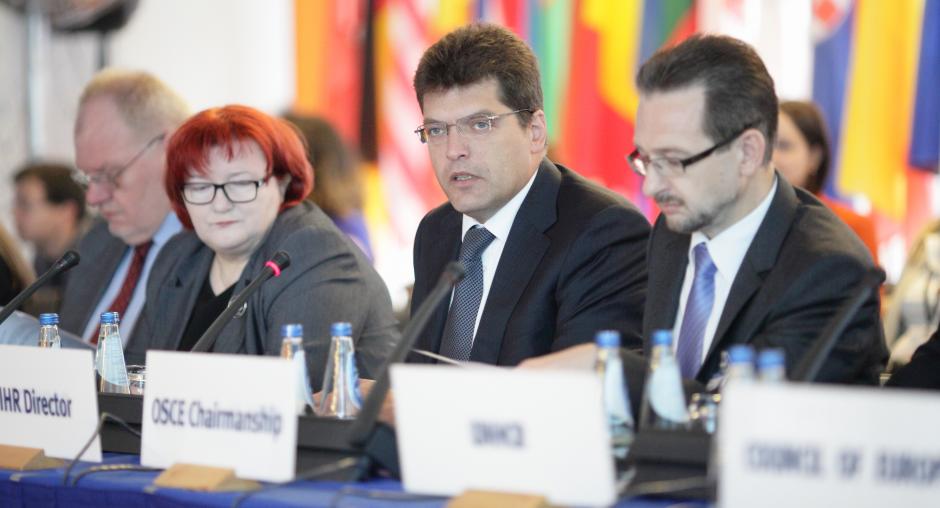Participants at Warsaw meeting highlight value of practical co-operation in realizing OSCE commitments in the Human Dimension

WARSAW, 12 May 2014 – Enhanced co-operation between the OSCE and regional and international actors is key to supporting the implementation of OSCE commitments in the Human Dimension, participants at the opening of an OSCE meeting in Warsaw said today.
The three-day event brings together more than 100 representatives of governments, international organizations and civil society, and is organized by the OSCE Office for Democratic Institutions and Human Rights (ODIHR), in co-operation with the Swiss Chairmanship of the OSCE.
Ambassador Janez Lenarčič, ODIHR Director, called on OSCE participating States and regional and international actors to make full use of the co-operative instruments available to them.
“In light of the many regional and international mechanisms for the promotion and implementation of the Human Dimension commitments, it is our duty to our beneficiaries to review and reinforce co-operation between the OSCE and its partner organizations,” said Lenarčič.
He also outlined the tools for co-operation available to the OSCE and regional and international organizations, including joint strategic planning, resource mobilization and institutional links.
Ambassador Thomas Greminger, Chairperson of the OSCE Permanent Council and Permanent Representative of Switzerland to the OSCE, urged participants at the meeting not to overlook the importance of high-level political co-operation and dialogue between the OSCE participating States and regional and international organizations.
“Political will is at the root of the implementation of Human Dimension commitments. Political will should not be taken for granted, and renewed efforts are required to reinforce the application of international standards,” said Greminger.
In a keynote address, Ambassador Ivan Šimonović, Assistant Secretary General for Human Rights of the United Nations Office of the High Commissioner for Human Rights (OHCHR), emphasized the need for international and regional actors to increase the efficiency of their co-operation by streamlining their use of resources towards delivering concrete results.
“The concerted approach of international and regional actors in facilitating the implementation of core OSCE commitments becomes even more important in today’s climate of shrinking resources and limited funding,” he added.
Ambassador Zoltán Taubner, Director of External Relations of the Council of Europe, stressed the importance of formal channels of co-operation, as these help to strengthen transparency and cohesion. “Although informal co-operation is often more flexible and fast-acting, formalized tools are essential to enhancing predictability and accountability,” he said.
Ambassador Adam Kobieracki, Director of the OSCE’s Conflict Prevention Centre, highlighted the role of the OSCE’s Platform for Co-operative Security in co-ordinating responses to crisis situations.
“When a crisis situation is unfolding and response is a matter of urgency, it can be difficult to allocate the time and resources required to co-ordinate activities between international actors. However, this is precisely the time when co-ordination and co-operation may be most important,” said Kobieracki.
Working sessions at the meeting will consider ways to facilitate the implementation of the OSCE commitments, including through strengthened consultation and co-operation with regional and international actors, improved assistance to OSCE participating States and enhanced dissemination and exchange of information between OSCE structures and regional and international actors.
